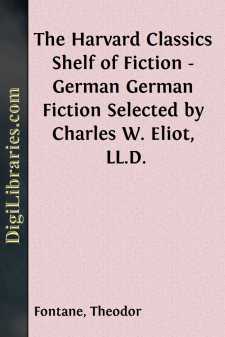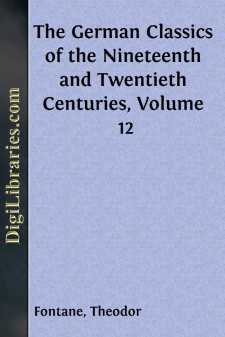Categories
- Antiques & Collectibles 13
- Architecture 36
- Art 48
- Bibles 22
- Biography & Autobiography 813
- Body, Mind & Spirit 142
- Business & Economics 28
- Children's Books 17
- Children's Fiction 14
- Computers 4
- Cooking 94
- Crafts & Hobbies 4
- Drama 346
- Education 46
- Family & Relationships 57
- Fiction 11829
- Games 19
- Gardening 17
- Health & Fitness 34
- History 1377
- House & Home 1
- Humor 147
- Juvenile Fiction 1873
- Juvenile Nonfiction 202
- Language Arts & Disciplines 88
- Law 16
- Literary Collections 686
- Literary Criticism 179
- Mathematics 13
- Medical 41
- Music 40
- Nature 179
- Non-Classifiable 1768
- Performing Arts 7
- Periodicals 1453
- Philosophy 64
- Photography 2
- Poetry 896
- Political Science 203
- Psychology 42
- Reference 154
- Religion 513
- Science 126
- Self-Help 84
- Social Science 81
- Sports & Recreation 34
- Study Aids 3
- Technology & Engineering 59
- Transportation 23
- Travel 463
- True Crime 29
The Harvard Classics Shelf of Fiction - German German Fiction Selected by Charles W. Eliot, LL.D.
by: Theodor Fontane
Description:
Excerpt
The fact that newspaper reporters commonly call their articles "stories" points to a certain analogy between the novel and the newspaper. Even when prose fiction aims to be a fine art, it readily takes on a journalistic character; it is usually designed for immediate effect--at the concomitant risk of producing no other--and it easily passes from hand to hand or from country to country. In our day prose fiction is almost an international phenomenon: novels of a high degree of popularity are immediately translated and promptly imitated in the most distant quarters of the globe.
In the universal give and take of literary commodities Germany has played her part and, from time to time at least, has been in no wise a debtor nation; but she has more often followed than led along new paths, making up in thoroughness what she lacked in originality, and a superficial history of the German novel would be little more than a record of how successive foreign influences were turned to account in domestic production. Thus, in the eighteenth century such sorrows as those of Werther would doubtless have found some form of expression, but Goethe could not have expressed them as he did without the example of Rousseau and Richardson. Wieland and Jean Paul Richter are inconceivable without Fielding and Sterne. In the nineteenth century the epochs of German novel-writing are marked by the times when Scott, Dickens, Balzac, Dumas, Sue, George Sand, Tolstoy, Ibsen, Bjornson, Turgenev, Zola, or some other foreigner, happened for the moment to be most conspicuous on the literary horizon. During the century that lies between Goethe and Hauptmann there is hardly a German novelist who has invited imitation abroad. It is in the lyric poem that the Germans have excelled, and in the drama and the opera that they have scored their international successes.
The history of the German novel would have, however, also to record that those writers have secured the most permanent distinction who have most significantly modified in their own way the suggestions which foreign examples gave them, and that the greatest distinction of all belongs to writers whom we can, if we will, associate with one or another of the main currents, but who are by no means carried away by it. In the work of these men the national character of the German novel, if it has a national character, ought to be discoverable.
For two reasons it is a fair question whether the German novel has a national character. In the first place, modern Germany has been a nation only since 1871; and in the second place, only in times of some great crisis does there appear to be in Germany a national life, as we understand the term. At other times life in Germany is urban, provincial, or private, in those aspects of existence which the Germans most prize. The imperial capital affects to represent Germany as London represents England and Paris represents France; but such ascendancy is stoutly denied Berlin in the capitals of the other states, and Saxons or Bavarians refuse to submit to Prussian hegemony in any other than political and military affairs. In literature Prussia is not the nation; the empire itself is a federation of states, and Berlin is less specifically a German city than any other in the realm. Germany is emphatically e pluribus. Still, there may be some bond of union stronger than political alliance, some fundamental quality common to Prussian, Saxon, and Bavarian. In this we should seek the national character. We should find the national character depicted in the historical novel, which has had a great vogue in Germany; but we may discern it also in the fiction devoted to the problems of contemporary life....



